This is rubbish: how Potato Head and Max Lamb turned trash into a design brand
Wasted is a new design brand by Potato Head, with a series of objects designed by Max Lamb made entirely from the hotel and beach club’s waste streams
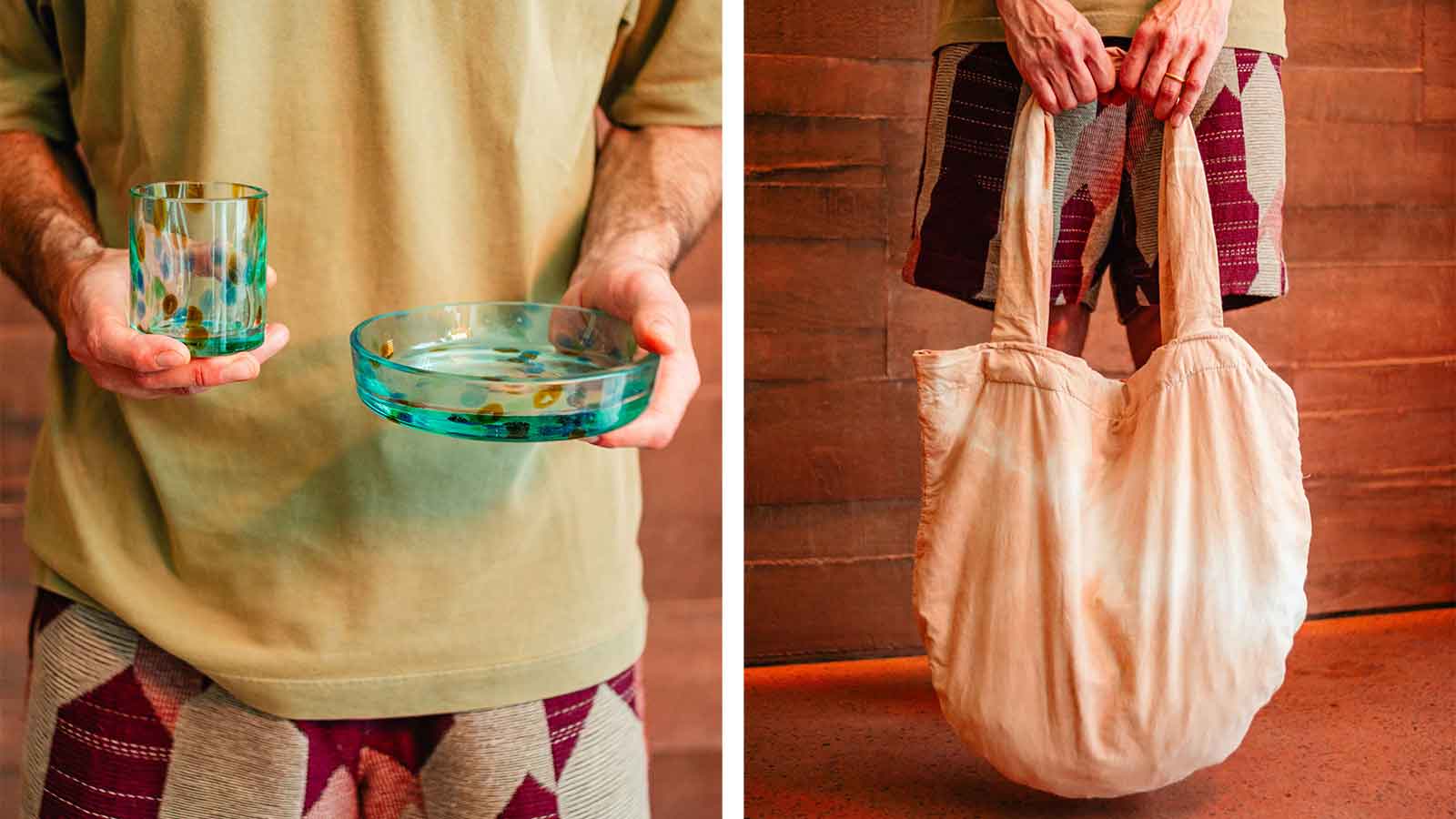
Potato Head, Bali’s beach club and hotel turned cultural village, has always been a champion of creative cross-pollination. With a building by OMA and furniture collections by the likes of Faye Toogood and Andreu Carulla, it is clear that design is at the heart of the project. At Potato Head, however, it goes hand in hand with environmental responsibility. ‘When we started Potato Head, [one of our goals was] to be sustainable in a beautiful way,’ reads a note from founder Ronald Akili introducing the first sustainability report from the company. ‘We want to create awareness by inspiring instead of preaching. We want to provide experiences and products where people do not have to compromise on beauty, comfort, and accessibility in order to be sustainable.’
Being zero-waste and contributing to a process of local regeneration were similarly important to the founder, and its newly launched collection of objects by long-term collaborator Max Lamb acts as a manifesto of sorts for what Potato Head stands for, and what a model for sustainable manufacturing might look like in the future.
Max Lamb at Potato Head
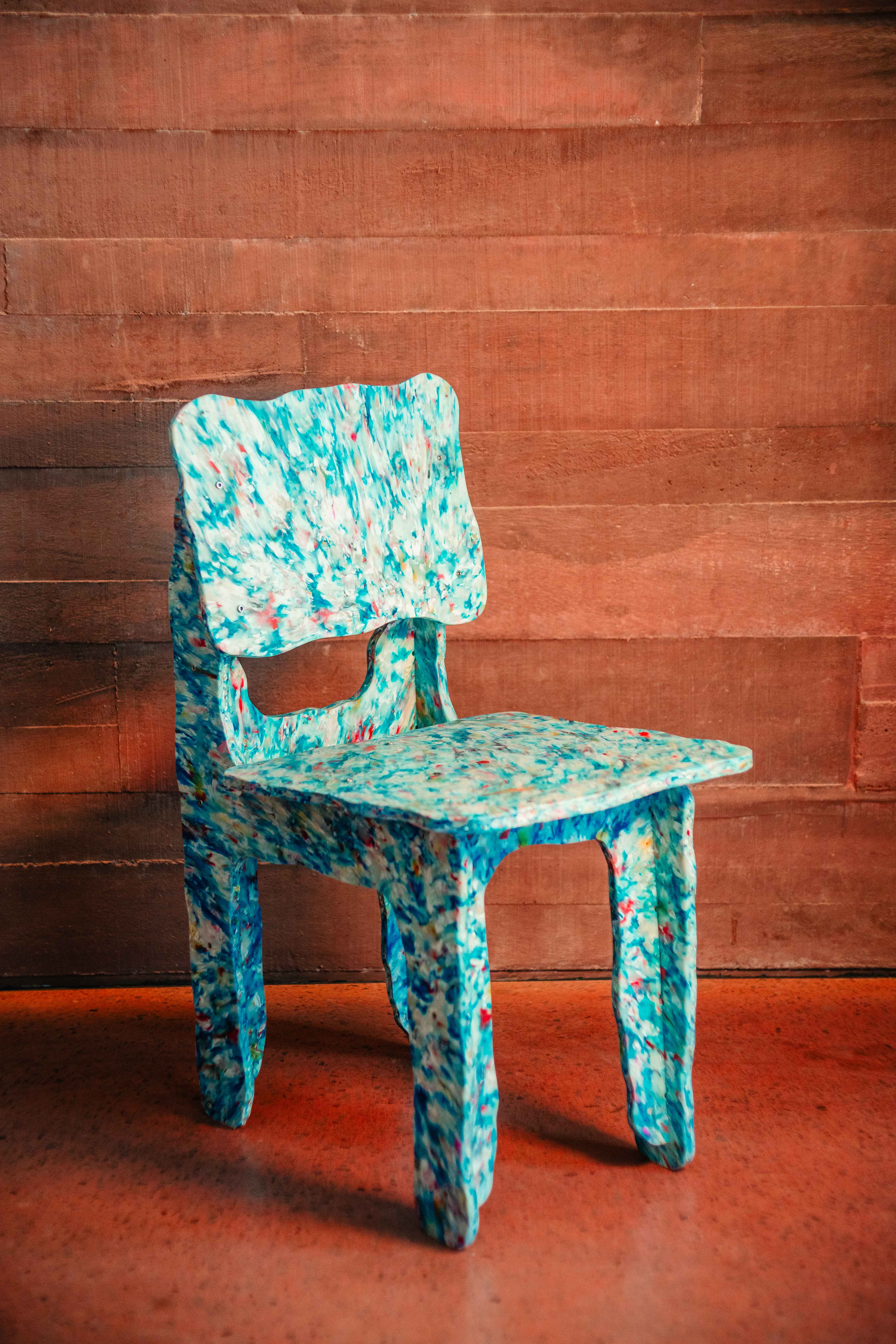
Plastic chair, made with flat sheets of 100 per cent recycled HDPE
Lamb has collaborated with Potato Head for a few years: his first visit in 2019 resulted in a series of in-room objects and furniture, circular designs all created in a closed-loop and produced locally by artisans and makers. ‘I was invited to design these products, the idea was that they should be made in Indonesia, as there is already a wealth of techniques and crafts,’ says Lamb. ‘So I spent two weeks travelling to different craftspeople, and what started as a small itinerary soon grew, as we kept discovering more places, from natural dye companies to ceramic producers, to stone workers who work with volcanic rock to traditionally make the small shrines you find in local homes.’
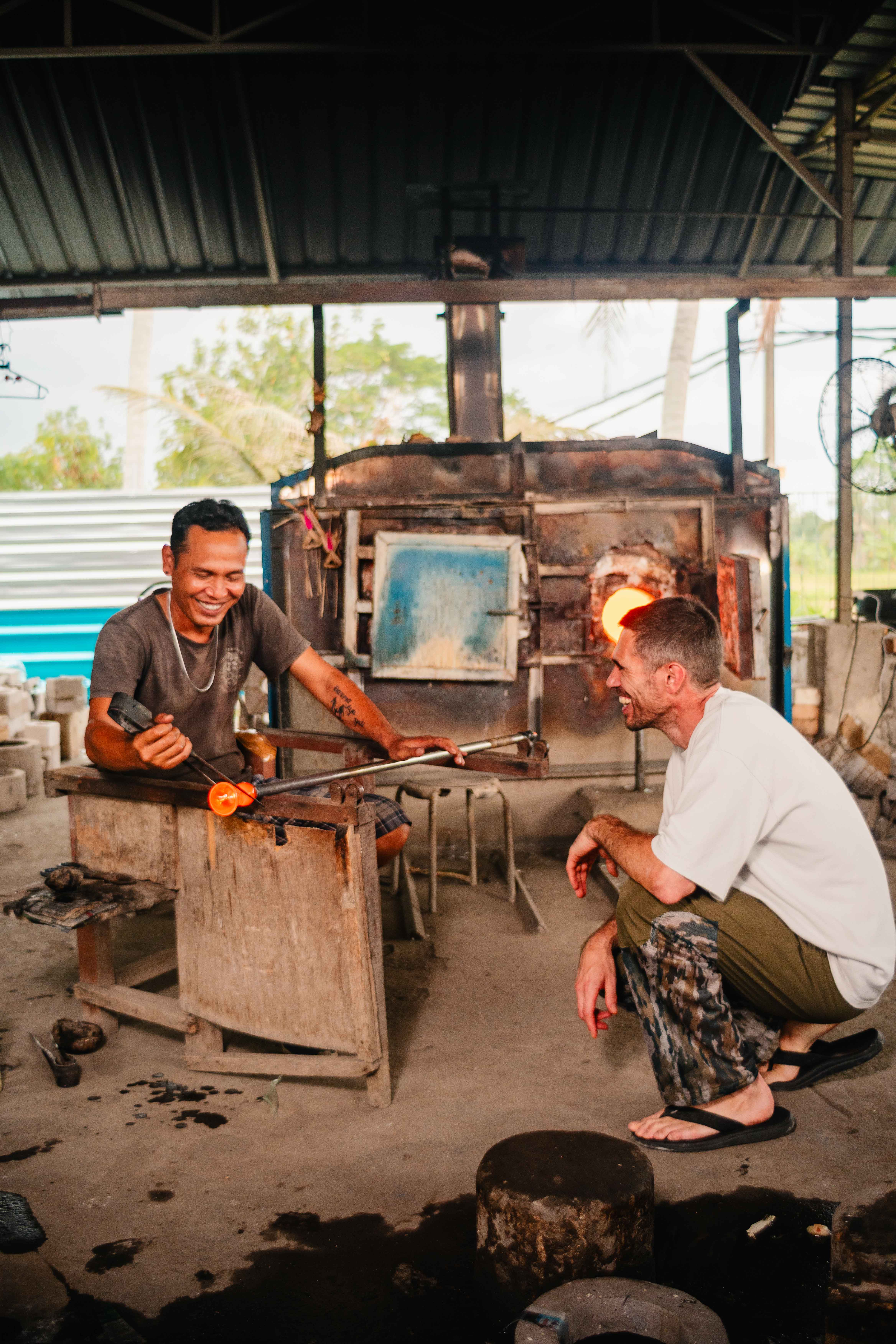
Lamb at the glassmaker's workshop in Bali, where the Broken Glass family is produced using recycled glass from Potato
Lamb, whose practice focuses on making and experimenting (his furniture has been made from a plethora of materials, from cardboard boxes to his grandfather’s tree), was right at home in the rich cultural and artisanal panorama of Bali and its surroundings. ‘Before traveling there, I was learning about the local brick and clay industries, and that sparked a research into the geology of the island,’ he says. ‘I was interested in the Ring of Fire and Bali being a volcanic island, and how the rock formations and the general landscape are informed by its geology and the geothermal activity.’
During his visit, however, Lamb started looking at Bali as a place to produce his work. ‘I was trying to experience Bali as deeply as possible to understand what the production and craft and material opportunities were there,’ he explains. ‘But it was also necessarily a conversation between me as a designer and the hotel, to identify all product opportunities to serve the hotel’s guests.’
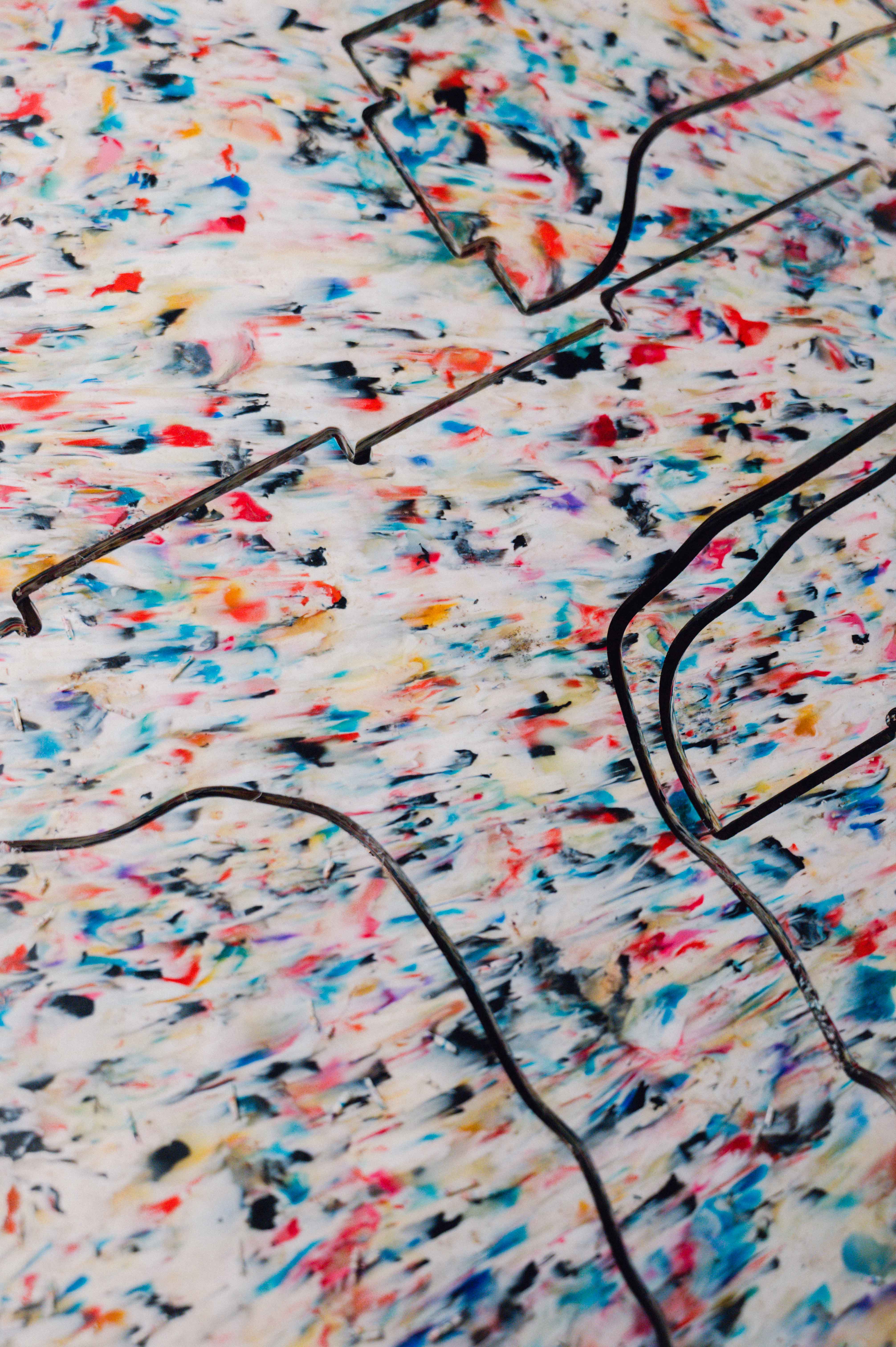
The HDPE sheet with CNC cuts for the chair - the negative material is used for smaller objects
At the time, Potato Head was already championing a zero-waste model (having gone carbon neutral in 2017, the first hospitality company in Indonesia to do so), and the conversation soon shifted from craft to waste materials. ‘Being hospitality, there is a constant influx of people and products, food and beverages and packaging being generated, and Potato Head recognised this,’ explains Lamb. ‘So what do you do with these materials?’
One of the first products they created together was a chair, made from recycling 833 plastic bottles. Featuring a colourful marbled effect, the chair has inspired a series of small objects made using the same system, from coasters to trays, all with the distinctive multichromatic pattern.
Receive our daily digest of inspiration, escapism and design stories from around the world direct to your inbox.
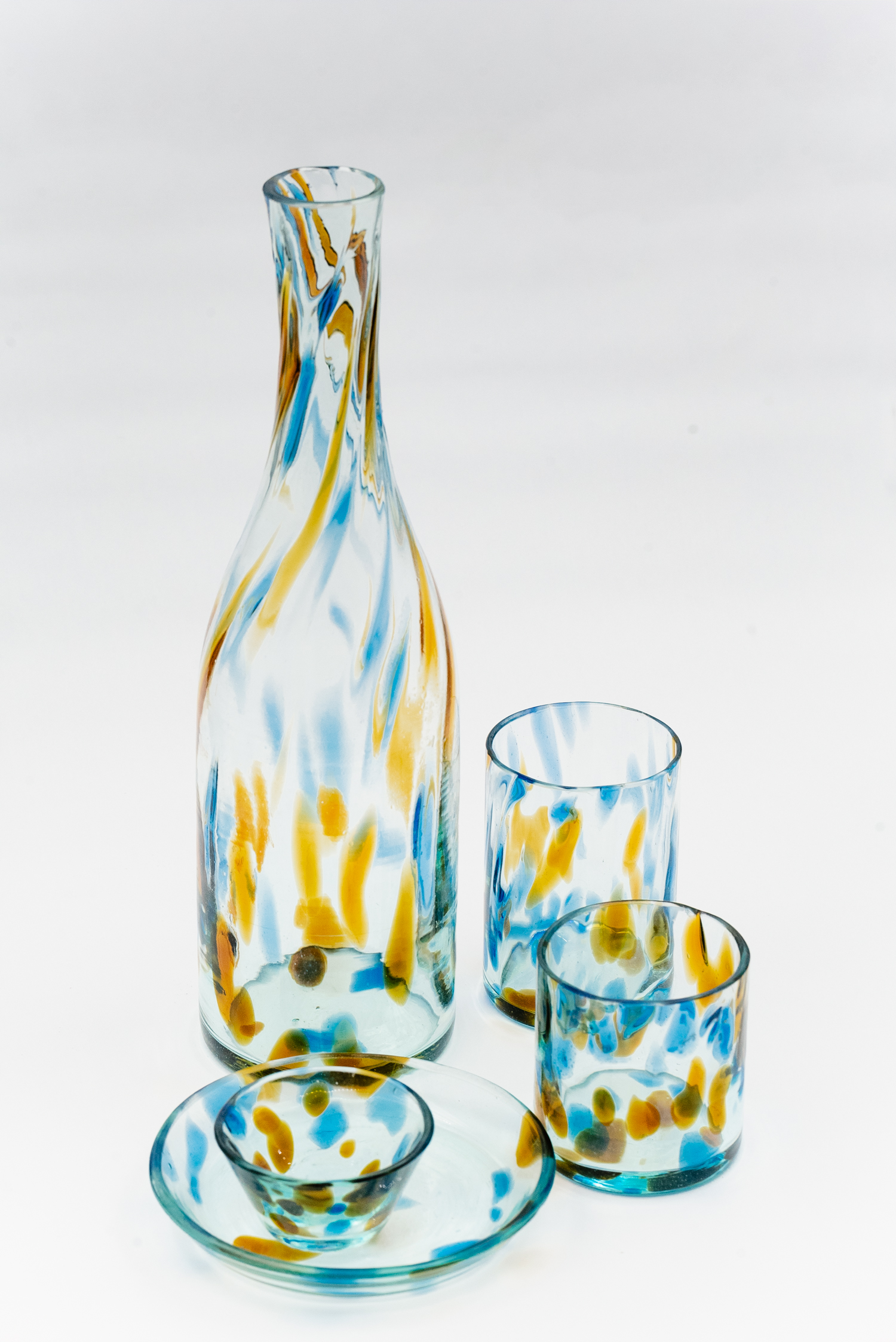
Broken Glass family
The plastic is all recycled from delivery packaging and confiscated water bottles (guests are not allowed to enter the Potato Head premises with non-reusable plastics), granulated on-site, and heat-pressed into sheets that are then used to create Lamb’s products. ‘What is great is that they built a factory, but it’s not behind the scene, it’s front of house: you get your plastics confiscated, you see it go into the granulator, the heat press, the CNC machine,’ says Lamb. ‘It's a really great reaction to the uncontrollable amount of waste material being generated through running any hospitality establishment.’
99.5 per cent of Potato Head’s waste – including food – is currently recycled and put back into the hotel, with a minimal 0.5 per cent going to landfill.
Wasted Collection 001 by Max Lamb for Potato Head
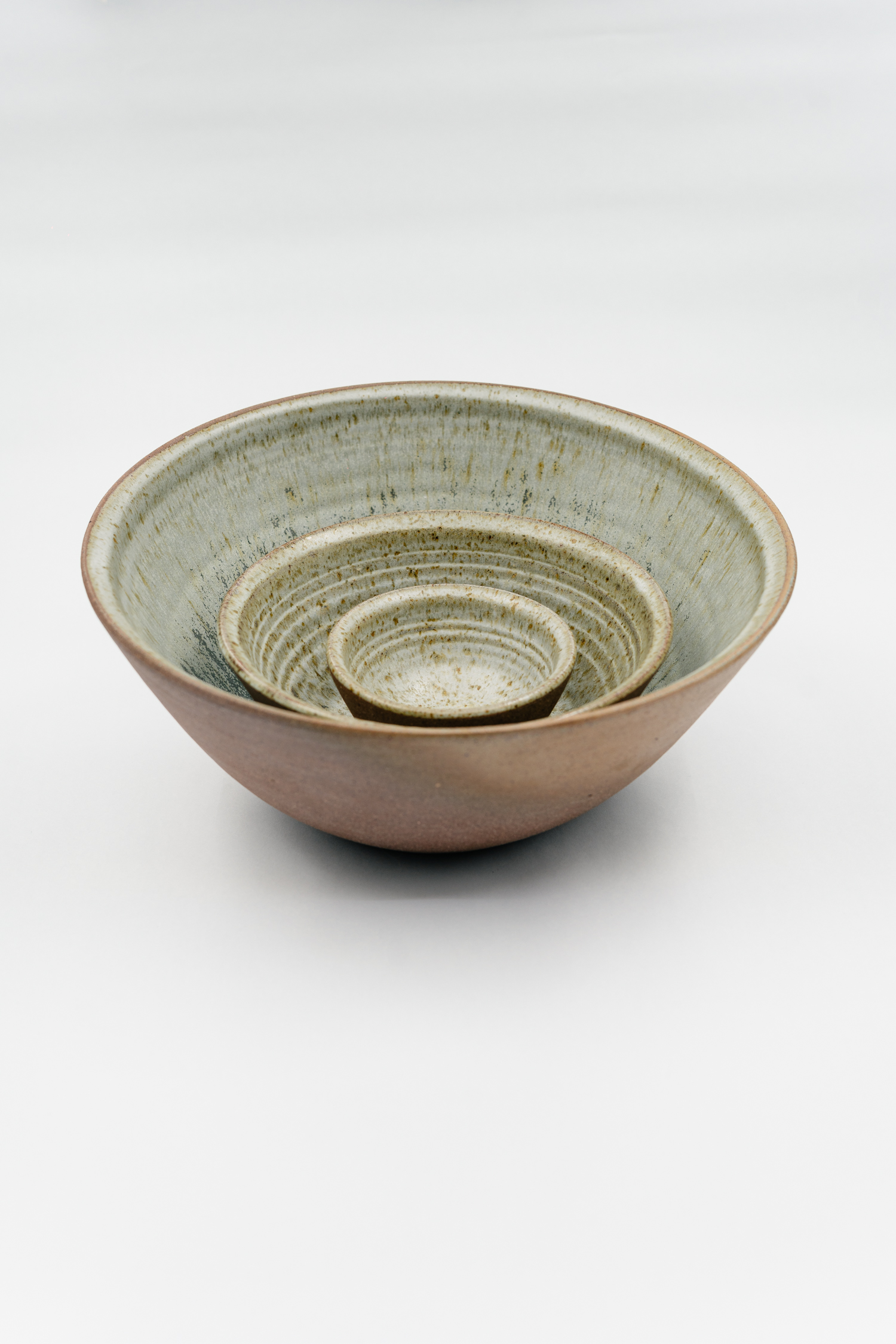
Broken Ceramic family, featuring three bowls (above) and three plates, made of Bali clay and a glaze made from powdered glass recycled from Potato Head
This month marks the launch of Wasted, a new brand by Potato Head that Lamb describes as ‘an attitude and an ideology for turning waste into new objects for both hotel guests and the wider community of interested people.’
With products designed by Lamb (who is also currently managing the design process and serving as the brand’s creative director), Wasted is an embodiment of Potato Head’s sustainability mission.
The objects on offer form a panorama of craft in Bali, and the opportunities found in recycling. The eight collections include objects made from HDPE plastics, composted organic matter, recycled linens from the hotel and restaurants, broken and re-blown glass, cooking oil transformed into scented and refillable candles, recycled ceramics, oyster shells, and hand-woven Balinese bamboo.
A small collection of ceramic plates and bowls are made in Ubud by a small pottery, using Balinese clay and a glaze made from broken glass from the hotel’s waste stream.
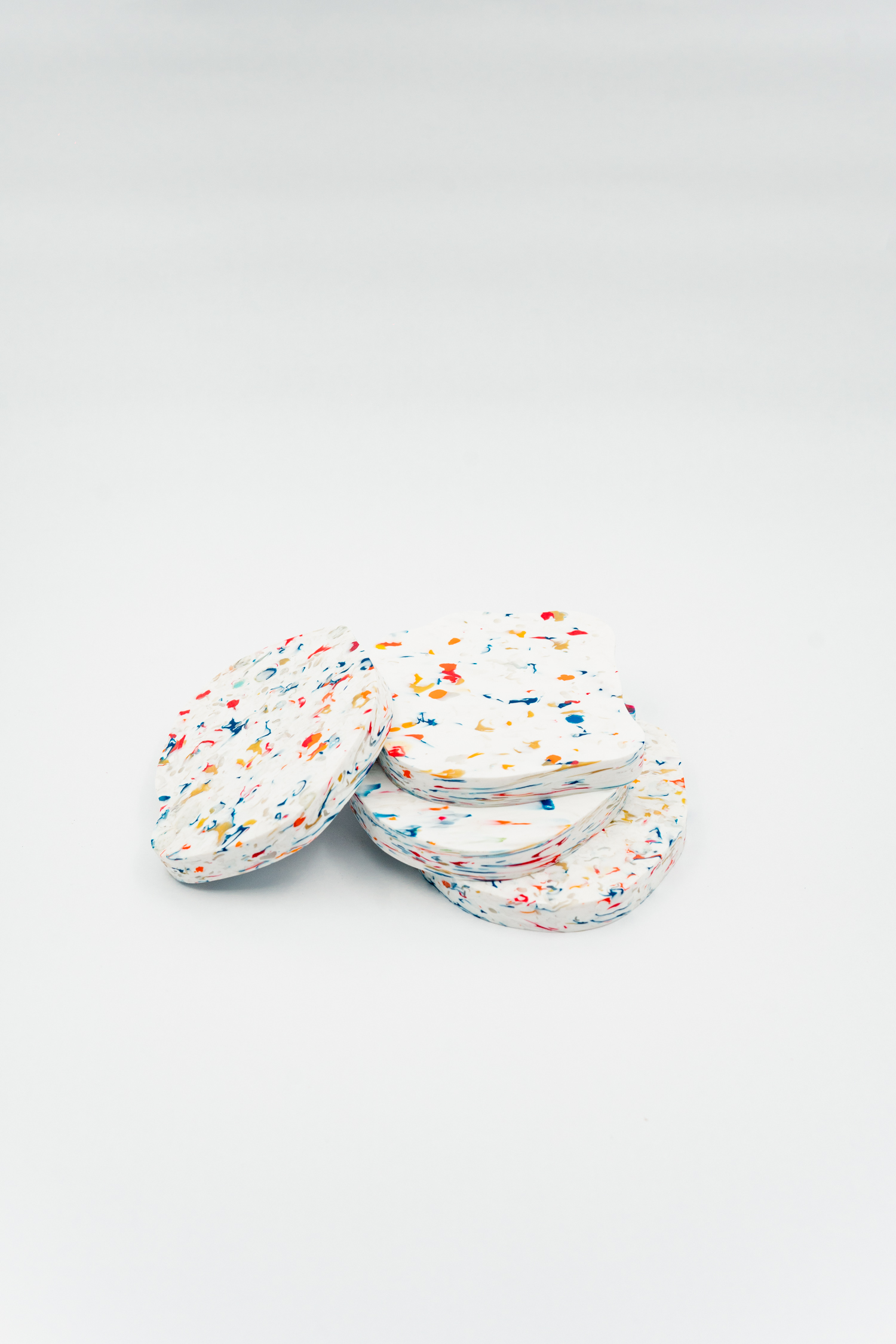
Coasters made of HDPE leftover from the chair pr
From the offcuts of his HDPE plastic chair, he has created trays and coasters. This way of working by repurposing materials is second-nature to Lamb: thinking in terms of waste, using the negative to his production’s positive has often been the case with his work (and as a young designer starting out, that was a necessity to be economical with materials). ‘I very rarely speculate: I nearly always only make what people ask me to make,’ he adds. ‘I have a sense of responsibility in my practice, I recognise that it’s very difficult to be productive without being destructive. But I'm very lucky in that I have a hungry audience, wanting to consume my work and commission me to make pieces. And I think there's something very, convenient about the fact that I run a workshop-based design practice.’ This modus operandi is now feeding into his work for Potato Head.
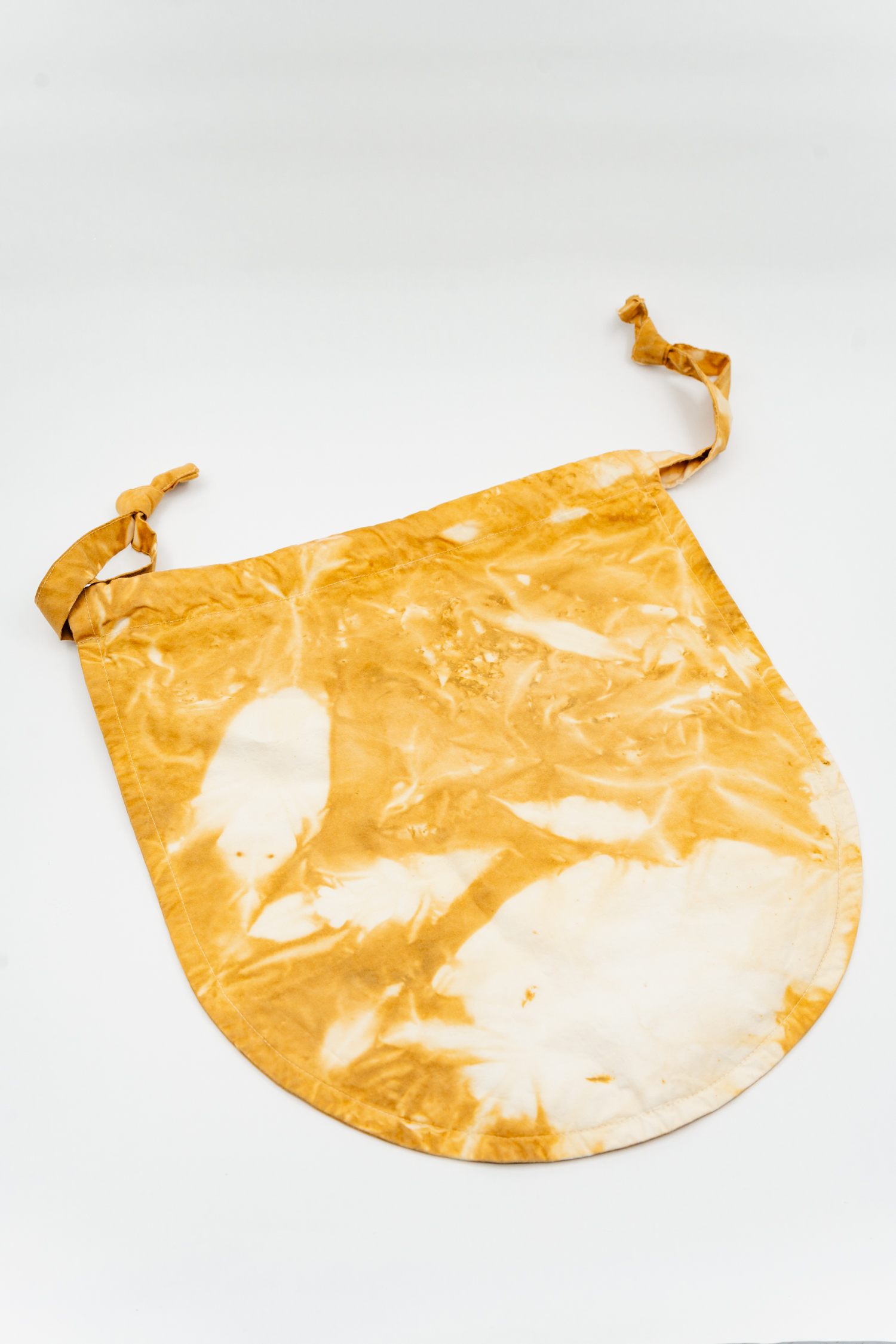
Compost Dye pouch made of hotel linen dyed with marigolds recovered from offerings at shrines across Potato Head
The textile products are a good example of Lamb's thinking throughout this project. 'Hotel linens have a short lifespan, they get stains, they tear, and can't be put back on the beds,' he explains. The collection includes large bags, but also smaller textile objects dyed using marigolds (recovered from offerings left at shrines across Potato Head), like compact pouches, pencil cases and sunglasses cases, that can be obtained from smaller scraps. 'By having a range of different scaled objects or products, we're able to best utilize as much of that material as possible.'
Wasted by Potato Head: what's next
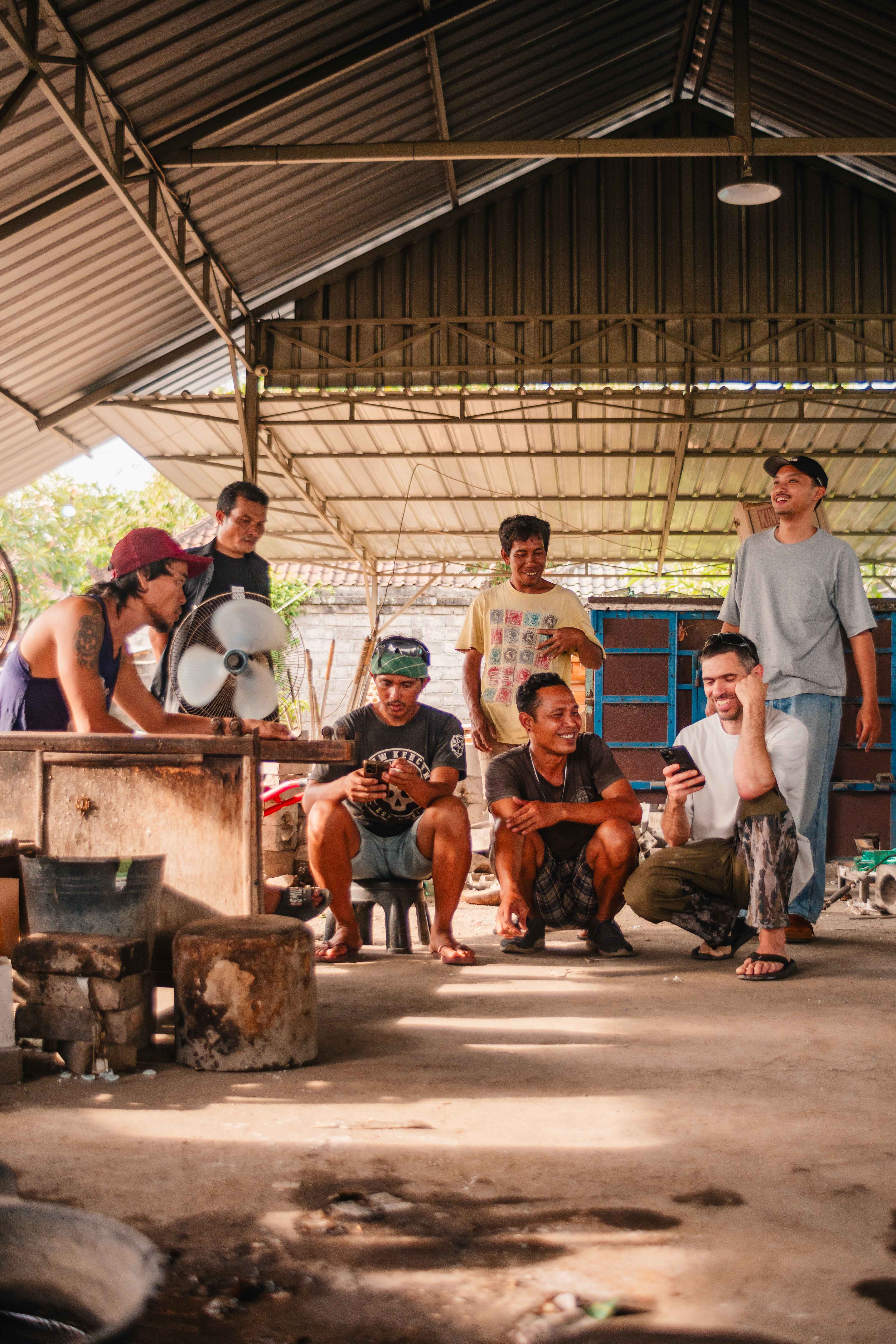
Lamb with the glassmaker'
The future of this project for Potato Head is very much about collaboration, as the model for Wasted is meant to become an open-source blueprint for harvesting waste. 'It's not about exporting these products, but about exporting this idea of working,' explains Lamb.
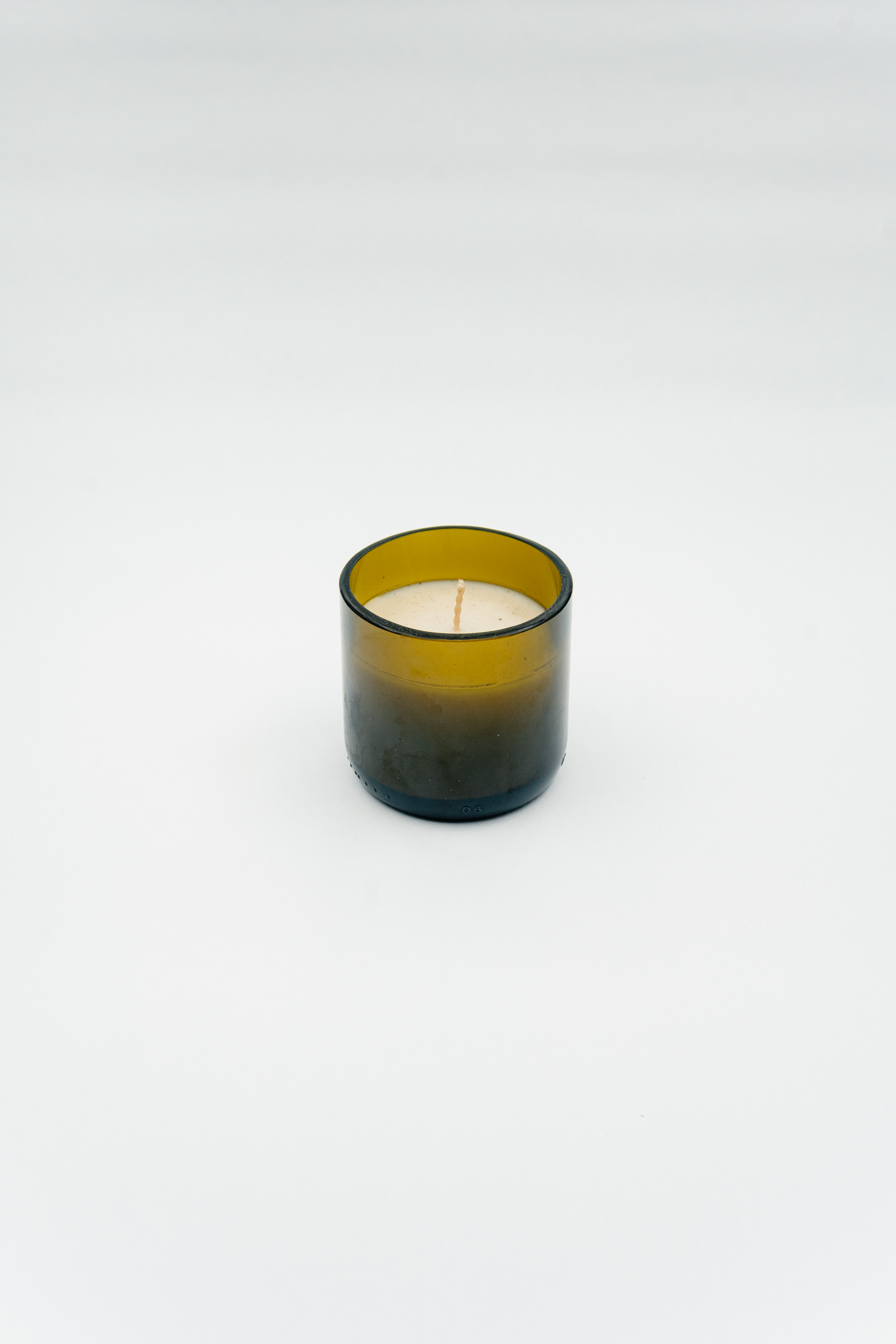
Waste cooking oil candle, in a glass container cut from a beer bottle
'This is not meant to be good design,' he stresses, noting that an elaborate design would defy the purpose of the project. 'I don't want to just adorn or decorate for the sake of it. It's always about the material, and if the form can be as quiet and simple and functional as possible, then the thing that will really shine will be the material. And then that allows the story of Wasted to be told much more.
'It’s meant to be about using a resource that would otherwise be thrown away, and helping Potato Head deal with the waste they generate on a daily basis. And to set the cogs in motion for establishing a new culture.'
Rosa Bertoli was born in Udine, Italy, and now lives in London. Since 2014, she has been the Design Editor of Wallpaper*, where she oversees design content for the print and online editions, as well as special editorial projects. Through her role at Wallpaper*, she has written extensively about all areas of design. Rosa has been speaker and moderator for various design talks and conferences including London Craft Week, Maison & Objet, The Italian Cultural Institute (London), Clippings, Zaha Hadid Design, Kartell and Frieze Art Fair. Rosa has been on judging panels for the Chart Architecture Award, the Dutch Design Awards and the DesignGuild Marks. She has written for numerous English and Italian language publications, and worked as a content and communication consultant for fashion and design brands.